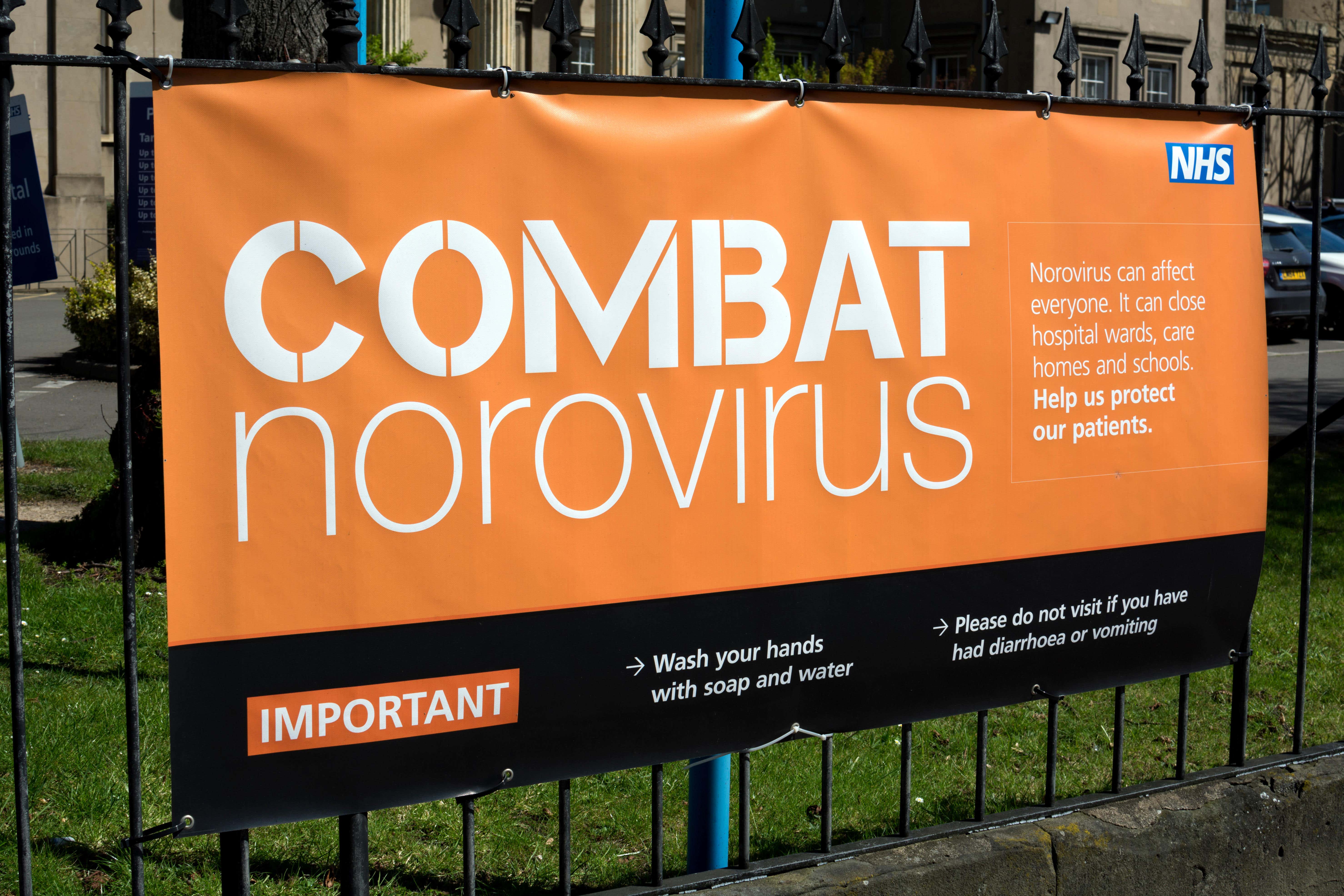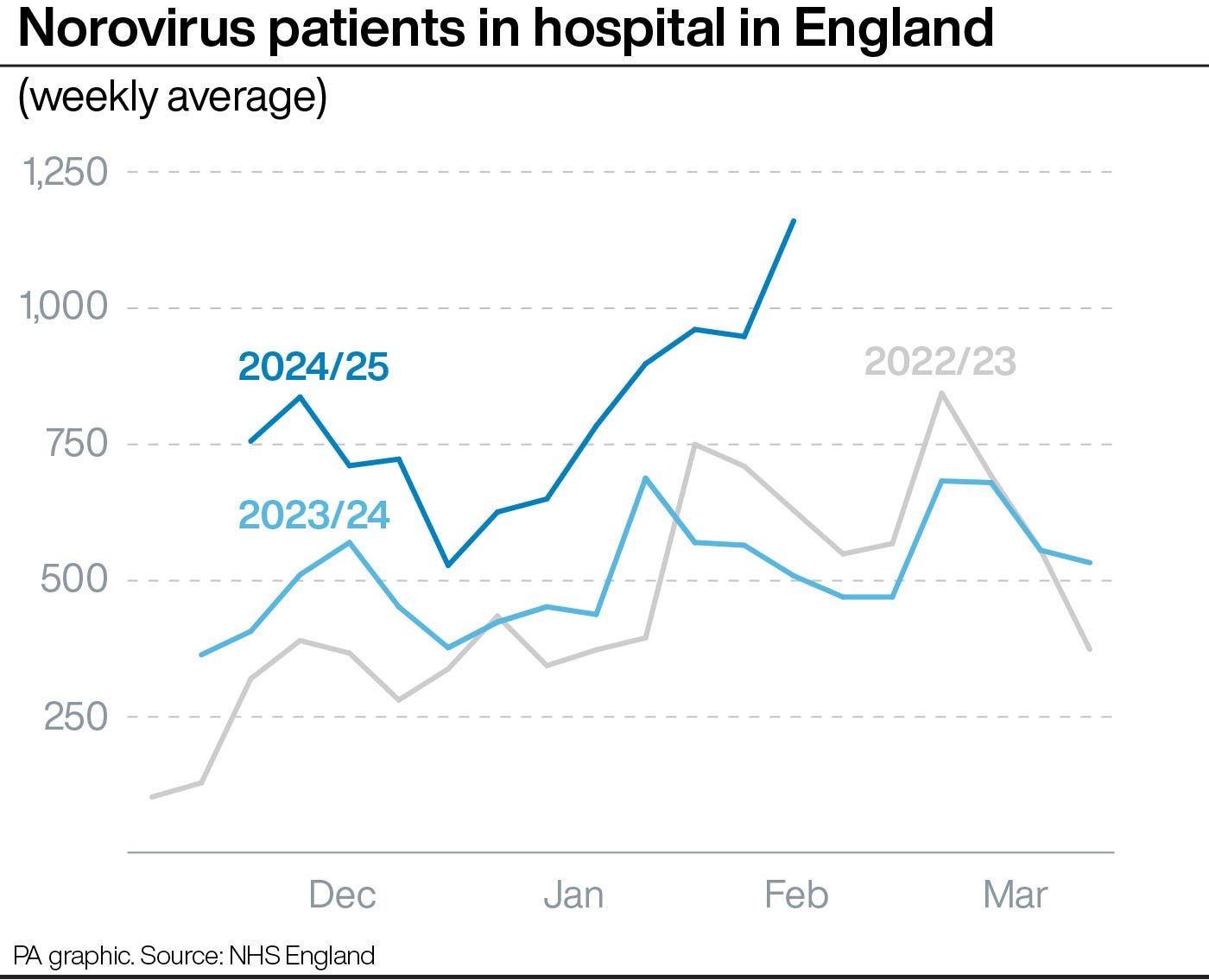ARTICLE AD BOX
An NHS hospital has been forced to shut its wards to new patients and restrict visitor numbers due to a norovirus outbreak.
Bedford Hospital in the Highlands closed both wards to new admissions and restricted visitor numbers just weeks after health officials warned of a possible second wave of norovirus as the dominant strain of the virus appeared to be shifting.
At the end of February, the UK Health Security Agency (UKHSA), which monitors laboratory reports of norovirus, explained that immunity to one strain of the virus doesn’t guarantee protection against others.
Data at the time revealed a surge in cases of the GII.17 norovirus genotype, although a more common genotype, GII.4, was increasing in prevalence.
While GII.17 still accounted for 59 per cent of cases, its dominance decreased from 76 per cent since November, suggesting a potential shift in the circulating strains and raising concerns about a resurgence of infections. This means individuals who contracted the GII.17 strain earlier in the winter could be susceptible to the rising GII.4 strain. The UKHSA continues to monitor the situation and advises the public to practice good hygiene, including thorough handwashing, to minimise the spread of the virus.
Meanwhile, the GII.4 strain saw a sharp rise, representing 29 per cent of cases compared to just 10 per cent three months prior.
The UKHSA reassured people that there is no indication that either GII.17 or GII.4 leads to more severe illness but said it is unclear whether norovirus cases have peaked for this winter.

Amy Douglas, lead epidemiologist at the UKHSA, said in February: “Norovirus levels are still exceptionally high and now with multiple genotypes spreading at the same time, people could end up getting infected more than once this season.
“We are seeing the biggest impacts in health and social care settings, such as hospitals and care homes.
“Symptoms of norovirus can be more severe in older adults, young children and those who are immunocompromised.
“If you have diarrhoea and vomiting, please do not visit hospitals and care homes or return to work, school or nursery until 48 hours after your symptoms have stopped and don’t prepare food for others, as you can still pass on the virus during this time.
“Alcohol gels do not kill norovirus. Wash your hands with soapy warm water and clean surfaces with bleach-based products where possible to help stop infections from spreading.”
It came as data from NHS England showed hospital norovirus cases remain close to the record high, with an average of 1,134 patients per day in hospital compared to 1,160.
The figure is more than double (up 141 per cent) the same period last year (470 per cent).
NHS England said visits to the NHS.uk webpage on norovirus rose by 40 per cent – from 53,052 to 74,324.
Meanwhile, the UKHSA lab data – representing a fraction of cases in the community – show confirmed cases in the two weeks from February 3 to 16 were 29.4 per cent higher than the previous fortnight and more than double the five-season average for the same period.
For every case reported in this national data, around 288 cases occur in the community, suggesting around three million cases annually in the UK.
Symptoms of norovirus
NHS
The main symptoms of norovirus usually start suddenly and may include:
- feeling sick
- being sick (vomiting)
- diarrhoea
You may also have:
- a high temperature
- a headache
- tummy pain
- body aches and pains
Professor Sir Stephen Powis, national medical director of NHS England, said “we can be under no illusions about the continued pressure staff are still facing”.
He added: “To help stop the spread of norovirus, the medical advice is to wash your hands frequently with soap and water and avoid mixing with other people until you have not had symptoms for two days.
“While pressures on hospitals remain incredibly high, people should continue to use NHS services in the normal way – using 111 and 111 online if you need advice and support for health conditions, and only using 999 or attending A&E in life-threatening emergencies.”
Health and Social Care Secretary Wes Streeting said: “These statistics show that we are still not out of the winter woods, and I want to thank all NHS staff for their hard work in the face of substantial pressures on the health service.
“We have taken important steps to reduce winter pressures this year, including getting doctors back on the frontline, rather than the picket line, and introducing the country’s first RSV vaccination scheme.
“Through the government’s Plan for Change, we will deliver the investment and reform required to turn our health service around, so it will be there for all of us when we need it, once again.”
The NHS England data released on Thursday also shows that time lost to ambulance handover delays rose by more than a fifth (22%) in the last week (to 22,796 hours compared with 18,688 the week before).
Ambulance handover delays occur when ambulances arrive at A&E but are unable to hand patients over to staff due to units being busy.

This means paramedics are unable to get back on the road to attend to other patients.
Overall, the NHS data showed that 95.3 per cent of all NHS adult beds are full with patients, with 96,807 patients in hospital each day.
Delays in discharging patients who are medically fit to leave hospital also remain high, with one in seven beds taken up by people who could be cared for elsewhere.
The interim chief executive of NHS Providers, Saffron Cordery, said: “NHS wards are full to the brim with barely any spare beds…
“Pressure on emergency services continues to be a huge worry for trust leaders, with a worrying increase in staff time lost to ambulance handover delays last week.
“We need to do everything we can to get ambulance services back on the road so they can get to the sickest patients, fast.”









 English (US) ·
English (US) ·